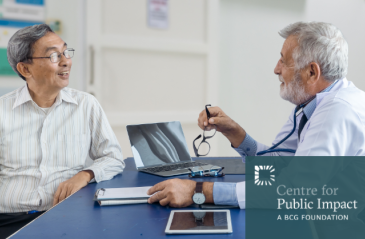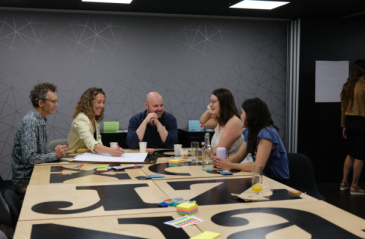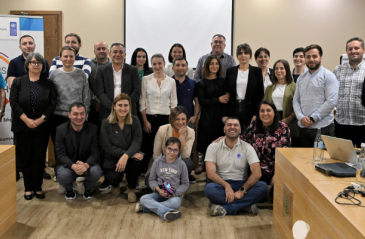
Five things we recently learned about government failure

After a 7 year absence, @KGeorgieva is back @WorldBank as chief executive – she has hit the ground running
Share article#Inequality is the fundamental obstacle of accelerating growth and prosperity says @KGeorgieva
Share articleTechnology can help development but it needs to be aligned with the outcomes you want to achieve, says @KGeorgieva
Share articleWe put our vision for government into practice through learning partner projects that align with our values and help reimagine government so that it works for everyone.
Few are as familiar with the global corridors of power as Kristalina Georgieva. Having occupied senior positions at the World Bank and the European Commission, her knowledge of the key players, as well as the raw reality of development, diplomacy and delivery, must be second to none.
No wonder, then, that World Bank President Jim Kim was so delighted to lure her back after a seven-year absence to take up a new role as chief executive of the International Bank for Reconstruction and Development (IBRD) and the International Development Association (IDA), the Bank's lending arms for middle-income and poorer countries.
The position places her at the heart of the Bank's efforts to build support across the international community in order to mobilise resources and develop more effective solutions - at scale - for the world's poorest communities. Easy? No. Energising and important? Yes.
It's encouraging to note that although challenges abound, there are some pockets of good news adorning the development horizon. Take East Asia, for example. As a region, it has had its share of challenges - including vulnerability to climate change, diseases related to poor nutrition, and deep-rooted areas of inequality.
However, it is also a region that is benefiting from accelerating growth, increasing domestic demand, and a rich array of natural resources. Georgieva, for one, is in no doubt that it is a region on the up. “When we think of the enormous improvement in the world in terms of the reduction of poverty and an improvement in quality of life, to a great extent we owe it to East Asia,” she says. “The region accounts for four-fifths of the reduction in poverty since 1990.”
She goes on to point out that much of this poverty reduction has been fuelled by the expanding numbers of the middle class. “What we are talking about is not just a drop in the number of people living in extreme poverty, but we are also talking about an incredible expansion of the middle class,” she says.
“These are people who now have the capacity to take care of themselves and their families, to be able to invest in their businesses, employing people who, not that long ago, were not even dreaming of that degree of independence. Every time I travel to the region, I feel more charged with the ‘yes we can' attitude that we need to deal with the problems of the world we live in.”
The World Bank's own research - its latest East Asia Pacific Economic Update - attributes the region's “positive outlook” to “stronger growth in advanced economies, a moderate recovery in commodity prices, and a strengthening of global trade growth”. Georgieva, while welcoming such data, is keen to stress that these statistics should not obscure the fact that much more remains to be done.
“We have to recognise that while the averages of the region are very impressive, there is a deeper and more complex story underneath,” she points out. “My professor of statistics used to say that you can put your head in the refrigerator, your feet in the oven and your temperature would be average - but you would be dead. This applies very much to the story of poverty reduction and middle-class expansion everywhere. This is particularly true in East Asia, because the region has been moving forward so rapidly - you can see the good, but you can also see that the accordion of opportunities has been opening wider.”
During her seven years away from the World Bank, Georgieva, a Bulgarian national, was working at the European Commission, first as commissioner for international cooperation, humanitarian aid and crisis response - where she managed one of the world's largest humanitarian aid budgets - and then as vice president for budget and human resources. There, she tripled the funding available to the refugee crisis in Europe and drove rapid progress towards achieving a target of 40% women in management by 2019 in order to improve the Commission's gender balance.
In her new role at the Bank, she will not only oversee the staff at the IBRD and IDA but also monitor and - where necessary - seek operational improvements across the Bank's activities. In particular, this means she will be ensuring that global practices work in harmony with the different regions - and vice versa. She is also the executive sponsor for the Bank's Agile Program, which empowers staff to identify and execute process improvements in short, iterative sprints to improve value delivered to clients and increase staff productivity and engagement. These improvements are helping the global practices work in greater harmonisation with the different regions and clients.
A good example of this is her work around the Bank's approach to education. Earlier this year, the Bank's World Development Report warned of a “learning crisis” in global education - so there is clearly much to do. Georgieva says that the Bank warned of a crisis for two reasons. “The first problem is that far too many kids are not in school - both boys and girls,” she points out. “When I was growing up, my best memories were from going to school - learning, playing with my friends. It is the right of every boy and girl to have this opportunity. The second problem is that even for kids in school, schooling is not the same as learning. In some cases, teachers don't turn up and in some cases, even when they do, they have nothing to teach. No schooling and no learning means no opportunities.”
To help address these difficulties, Georgieva cites technology as having a key role to play, and draws from her own experience while working as World Bank managing director in Russia to help illustrate her point. “It is a huge country, but we had the goal that every school should have the same curriculum as the kids in Moscow,” she recalls. “We used technology to create centres where teachers would come and where we could communicate the curriculum everywhere and set tests that were universal for the whole country. Then we would know if the quality of teaching and learning would be more or less standardised.”
However, she is also keen to stress that deploying technology is only one piece of the jigsaw - it also needs to be aligned with the outcomes you want to achieve. “As we think about outcomes and the measurable impact of learning for kids and their prospects, I cannot say enough about how important this is,” she says.
“We also need to remember the people who are left furthest behind. If you're talking about the Central African Republic, or war-torn parts of Mali, or Yemen, then regular outcome-based learning is not yet there. A part of what we do is rooted in the very basics - ensuring there are schools and that there are reasonably well-trained teachers teaching kids in classrooms. For that, you need long-term, sustained political commitment and no yo-yoing priorities.”
But as she gears up for her second full year in post, Georgieva is clear that targeting inequality will be at the epicentre of the Bank's approach and hers to eradicating poverty and boosting shared prosperity.
“I believe in my heart of hearts that inequality is the fundamental obstacle to accelerating growth and prosperity,” she concludes. “If we are not able to tap into the talent of all people, then the reservoir for growth will start to shrink. And when we talk about ‘equality', it means not just equality in income. Before that equality of income comes equality of gender, equality of opportunity, equality of jobs, and equality of resilience to shocks and challenges.”
It's quite a wish-list, but one that will surely serve as ample fuel for her journey ahead.
Picture credit: Belish / Shutterstock.com











